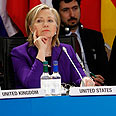
Clinton defends outreach to Syria despite Scud row
Ahead of NATO meeting in Estonia, US secretary of state says ambassador in Damascus 'can give us extra leverage, added insight, analysis, information with respect to Syria's actions, intentions'
The United States defended its policy of engagement with Syria on Thursday despite its concerns that Damascus might be trying to transfer Scud missiles to Hezbollah guerrillas in Lebanon.
Speaking in the Estonian capital of Tallinn ahead of a NATO meeting, Secretary of State Hillary Clinton dodged questions about whether Iran might have given Syria Scud technology ultimately destined for Lebanon's Hezbollah, a Shiite Islamist group.
Israeli President Shimon Peres has accused Syria of sending Scuds to Hezbollah. Syria denies the charge and says Israel may be using the accusation as a pretext for a military strike.
Such a weapons transfer could threaten US President Barack Obama's diplomatic outreach to Syria and create fresh obstacles to US Senate confirmation of a new ambassador being sent to Damascus after a five-year absence.
"We have expressed directly to the Syrian government ... in the strongest possible terms our concerns about these stories that do suggest there has been some transfer of weapons technology into Syria with the potential purpose of then later transferring it to Hezbollah," Clinton told a joint news conference with Estonian Foreign Minister Urmas Paet.
Washington has long accused Tehran of arming Hezbollah, which fought a war with Israel in 2006 and enjoys deep support in mainly Shiite south Lebanon.
'Influence behavior in Syria'
But the United States has not publicly addressed where Syria itself may have obtained the Scud missiles nor has it said it could confirm that any transfer to Hezbollah took place.
Despite Syria's failure to satisfy long-standing US demands that it cease interfering in Lebanon's affairs and make greater efforts to forge peace with Israel, Clinton argued that it was in the US interest to have an ambassador in Damascus.
"This is not some kind of reward for the Syrians and the actions that they take which are deeply disturbing," Clinton said. "It's a tool that we believe can give us extra leverage, added insight, analysis, information with respect to Syria's actions and intentions."
The last US ambassador to Syria was withdrawn in 2005 after the assassination of former Prime Minister Rafik al-Hariri. The killing triggered an international outcry that led Syria to end its 29-year military presence in Lebanon.
The Obama administration's plan to return an ambassador to Damascus has been criticized by some Republicans, including Representative Dan Burton, who this week said that the Syrians "just spit right in our face."
Clinton noted Washington's long list of complaints against Damascus, which include accusations that it hosts Palestinian militants and fuels violence in Iraq, but said an ambassador would help to convey the US message.
"We think having an ambassador there adds to the ability to convey that message strongly and hopefully influence behavior in Syria," she said.










